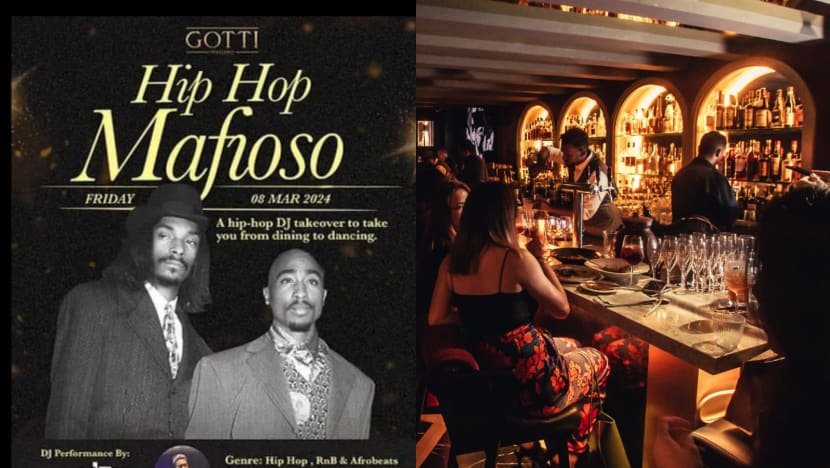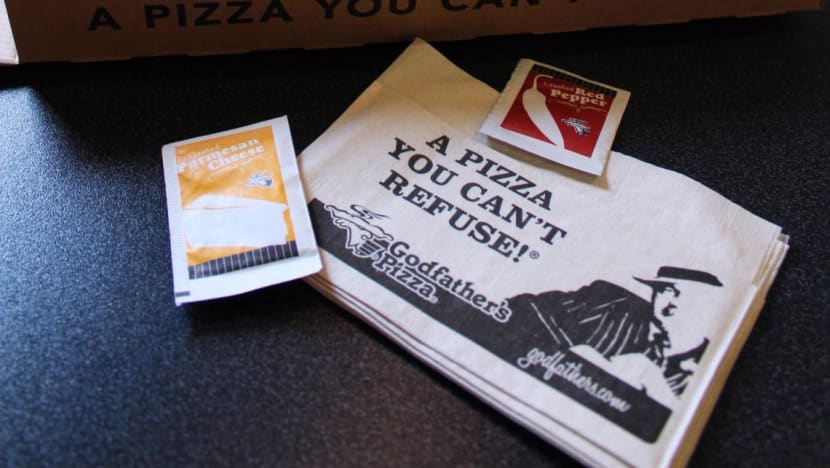Commentary: Restaurants that reference crime and gangsters play a risky PR game in Singapore
An Italian restaurant named after infamous mafia boss John Gotti has quite rightly come under criticism in Singapore, says journalist and editor Christian Barker.

An online poster (left) promoting the Hip Hop Mafioso event at Italian restaurant Gotti Italiano. (Images: Gotti Italiano, Facebook/Gotti Italiano)

This audio is generated by an AI tool.
SINGAPORE: From art to cuisine, sport and fashion, Italy has made countless important contributions to popular culture. So it’s hardly surprising that some Italians may be frustrated when one of the country’s least desirable exports is used as a marketing gimmick.
Italy’s Ambassador to Singapore, Dante Brandi, was far from amused about an Amoy Street restaurant called Gotti Italiano promoting a mafia-themed party in March. He wrote on Facebook: “Naming your club after an infamous criminal family and catching clients with a ‘Hip Hop Mafioso’ night is certainly not illegal, but - allow me to say - is definitely of a dubious taste.”
Rightly or wrongly, many still see the mafia as emblematic of Italy. It’s used as shorthand by restaurants, bars and cafes around the world to indicate Italian-style hospitality that "you can’t refuse".
Granted, this can be a winning formula. In 1973, inspired by Mario Puzo’s best-selling book on a fictional Italian-American crime family, the Corleones, and Francis Ford Coppola’s Oscar-winning cinematic adaptation, an Omaha entrepreneur opened a restaurant named Godfather’s Pizza.
Thanks in no small part to its witty mafioso-themed marketing, in the mid-1980s, it became the third-largest pizza chain in the United States. Today, Godfather’s Pizza brings in nearly US$1 billion per annum in revenue.

LONG LIST OF F&B OUTLETS THAT ALLUDE TO FAMOUS CRIMINALS
Godfather’s Pizza is far from the only example of naming a restaurant after a mafioso or criminal organisation. According to a study conducted by Coldiretti, Italy’s largest farmers’ association and a vocal opponent of organised crime involvement in the food industry, there are around 300 bars, restaurants and cafes around the world with names alluding to famous criminals and crime cartels of Italian origin.
These spread as far afield as Indonesia’s Nasi Goreng Mafia chain, Finland’s Don Corleone restaurant, and Gambino’s pizzeria in Bucharest, Romania.
Gotti Italiano isn’t the first Singapore F&B outlet to spark uproar by taking the name of a murderous criminal. In 2018, the Colombian embassy objected to a bar being opened in the Central Business District named after cocaine kingpin, Pablo Escobar.
During his period as Colombia’s most powerful drug lord, Escobar was responsible for hundreds of terrorist attacks and "the death of around 20,000 people in all possible violent ways", the embassy explained in an official note to the Ministry of Foreign Affairs.
Proving that not all hospitality businesses given the name of a criminal “godfather” are guaranteed to be a success, Escobar closed in 2023. Another F&B outlet using the cartel leader’s likeness, Pablo’s Kitchen burger bar in Queenstown, shut down within a few months of its 2021 opening.
OTHER SINGAPORE RESTAURANTS HAVE FLOWN UNDER THE RADAR
Local venues referencing Singapore’s own underworld history have largely managed to fly under the radar and avoid controversy, however. The now defunct Operation Dagger on Neil Road made it to number 22 on the World’s 50 Best Bars list and attracted serious mixology enthusiasts with its innovative cocktails.
No one batted an eye at its name, which references an island-wide police operation in 1956 cracking down on secret societies and gang violence.
Last year saw the opening of a stylish speakeasy in Robertson Quay by the name of Chandu, which translates to “opium” in Malay (or the more innocuous “moon” in Hindi).
The bar takes inspiration from early 20th Century Singapore, when all manner of products were shipped in and out of our docks and opium dens abounded. A cocktail called “Chasing the Dragon”, a colloquialism for smoking opium, alludes to this history.
It's interesting that these bars haven’t provoked the outrage that Gotti Italiano or Escobar experienced. Maybe it’s because their gangland references are more obscure and subtle, only apparent to students of Singapore’s history. Or perhaps it’s because the proprietors of these venues do not appear to glorify vicious killers.
The line between paying homage to history and glamourising crime is admittedly blurred. Al Capone’s, a franchise of sports bars in Singapore, has also not ruffled feathers - despite its namesake being one of the US’ most notorious criminals from the 1920s.
Perhaps the Gotti episode serves to show that naming a restaurant or bar after murderous psychopaths comes with PR risks. Glorifying homicidal maniacs can leave a bad taste in the mouth, and that is something any F&B outlet should strive to avoid.
Christian Barker is a Singapore-based journalist and editor who covers luxury, travel, business, culture and men’s style.


















